What is the Sudden Emergency Defense?

The typical first question that arises in most motor vehicle accidents is: who was the cause of the accident? From the standpoint of the plaintiff, our main issue is whether or not the defendant (the person being sued), caused the motor vehicle accident. In certain instances, that defendant may well admit they caused the motor vehicle accident, and thereafter suggest that they should not be responsible for any injuries or damages arising from the motor vehicle accident due to a sudden emergency or sudden illness. This is typically described as the sudden emergency defense or medical emergency defense.
The sudden emergency or medical emergency defense is very limited in the State of California.
First of all, this defense does not apply to a mental health condition or mental illness. California Civil Code §41 states: “A person of unsound mind, of whatever degree, is civilly liable for a wrong done by the person. . .” As to other persons with no mental health issues, there is a potential and narrow defense for an individual who is suddenly and unforeseeably struck by a physical illness while driving a motor vehicle.
The sudden emergency defense generally states that the defendant-driver, was not negligent, because he or she acted with reasonable care in an emergency situation. The defendant-driver was not negligent if he or she proves all of the following:
- There was a sudden and unexpected emergency situation in which someone was in actual or apparent danger of immediate injury;
- That defendant-driver did not cause the emergency; and
- That defendant-driver acted as a reasonably careful person would have acted in similar circumstances, even if it appears later that a different course of action would have been safer.
This is sometimes referred to as the imminent peril doctrine, and can be used either by the defendant- driver or by a plaintiff, and sometimes both, if the circumstances exist.
In California, a driver suddenly struck by an illness which he could not anticipate while driving an automobile, which makes it impossible for him to control the car, is not negligent! The motorist must be faced with an emergency situation by no fault of his own, and is thereafter held to a standard of care of a legally prudent person under the same or similar circumstances experienced by the motorist.
Generally, this is a defense used by defendants and defense counsel when all other potential defenses are unavailable or fail. When the defendant-driver raises this defense in a motor vehicle accident, that defendant has the burden of proving that the physical condition arose, that it was unforeseeable, and that it rendered the driver incapable of operating the motor vehicle. This is just one example of the issues that arise in motor vehicle accident litigation.
The Heiting & Irwin have been representing individuals and families with personal injury and wrongful death claims for many years. Free consultations on all types of personal injury claims are available at the Law Offices of Heiting & Irwin.
Photo Credit: https://www.flickr.com/photos/ekavet/
